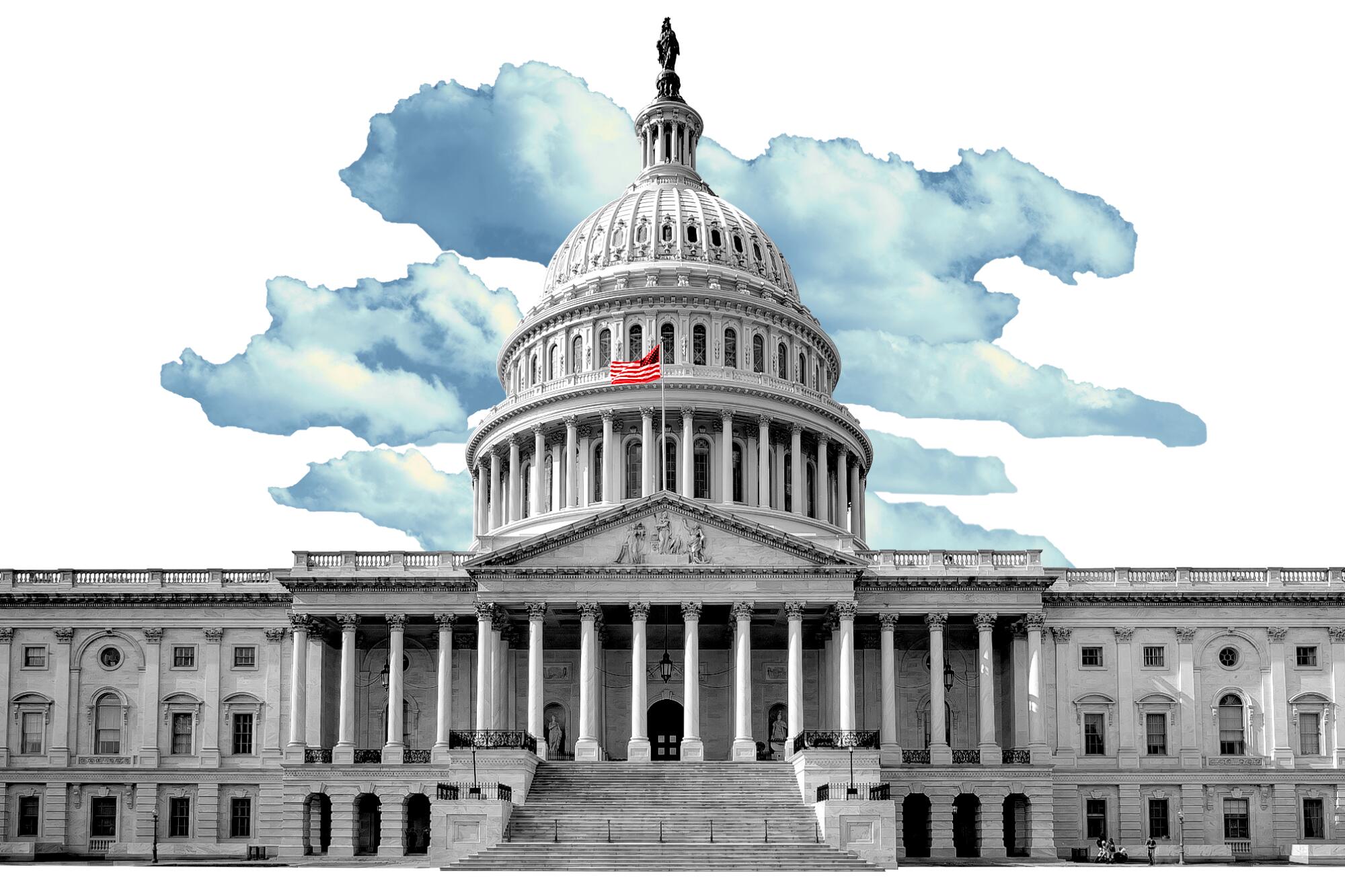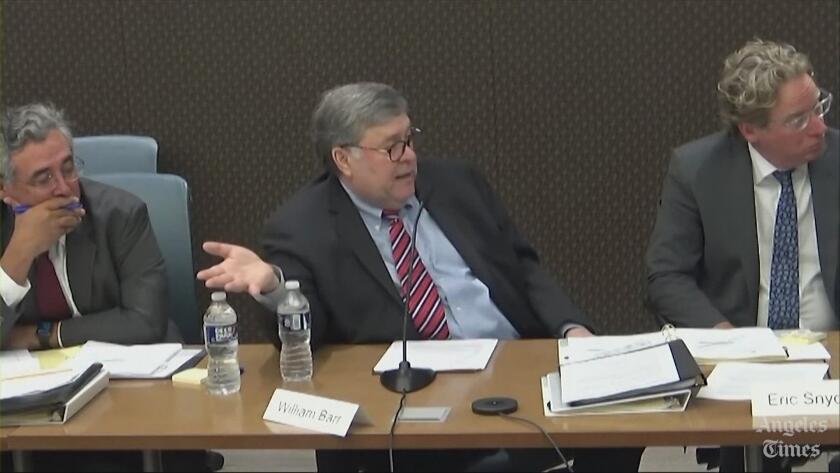Liz Cheney teases bombshells to come as first hearing comes to a close
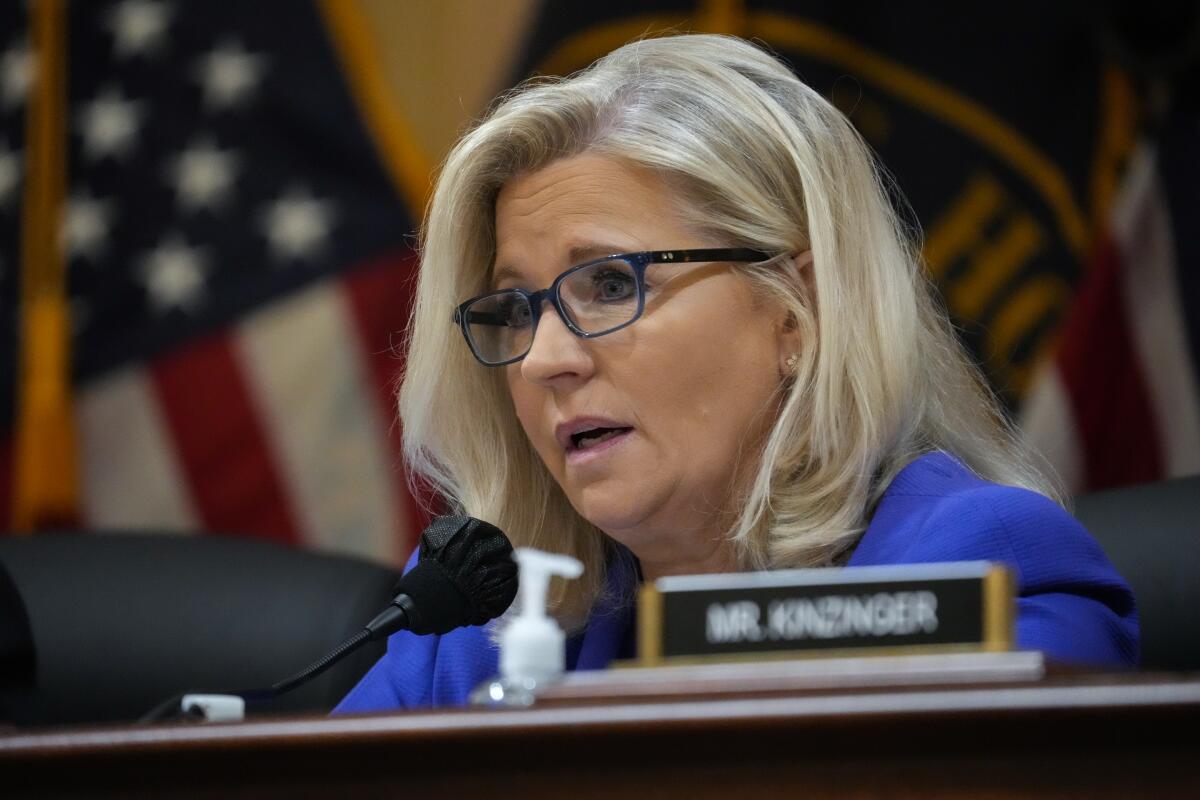
As rioters battered police and stormed inside the Capitol building on Jan. 6, 2021, then-President Trump grew angry with advisors pleading with him to do something, Vice Chairwoman Liz Cheney said Thursday in the first public hearing by the House select committee investigating the attack.
Aware of the rioters’ chants to “hang Mike Pence,” Trump responded with this sentiment, Cheney (R-Wyo.) said: “‘Well, maybe our supporters have the right idea. Mike Pence,’ quote, ‘deserves it.’”
The revelation was just one of the bombshell allegations that Cheney said the committee will corroborate during subsequent hearings to prove a coordinated effort to stop certification of the 2020 presidential election and keep Trump in office despite his election defeat.
Cheney said the panel will also reveal evidence that Rep. Scott Perry (R-Pa.) and other Republican members of Congress sought pardons after Jan. 6 for their roles leading to that day and that the president’s Cabinet secretaries considered invoking the 25th Amendment to remove Trump from office.
Officer describes searing image, ‘slipping in people’s blood,’ as Capitol turned violent
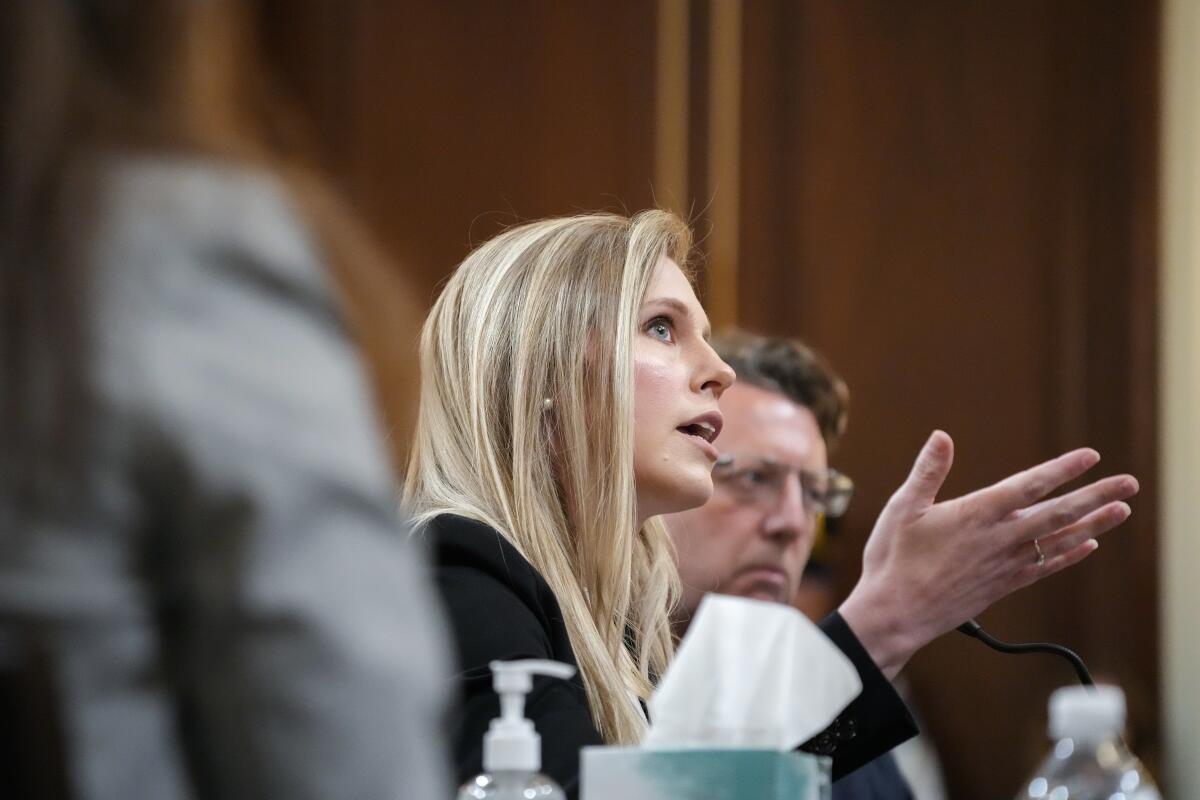
The videos were compelling. The evidence was damning. But the most emotionally compelling moments in the first hearing came from Caroline Edwards, a Capitol Police officer and the first law enforcement officer injured by the rioters.
It will be hard to forget the image she painted, as she spoke haltingly about “slipping in people’s blood.”
“It was something like I’d seen out of movies. I couldn’t believe my eyes,” she said. “There were officers on the ground. You know, they were bleeding. They were throwing up. I mean I saw friends with blood all over their faces. I was slipping in people’s blood. You know, I was catching people as they fell. It was carnage. It was chaos. ... I can’t even describe what I saw. I never in my wildest dreams did I think that as a police officer, as a law enforcement officer, I would find myself in the middle of a battle.”
Capitol Police officer: ‘Hours of hand-to-hand combat’
I’m not combat trained. And that day, it was just hours of hand-to-hand combat. Hours of dealing with things that were way beyond any any law enforcement officer has ever trained for.
— Capitol Police officer Caroline Edwards
Injured police officer cuts against Trump’s ‘law and order’ message
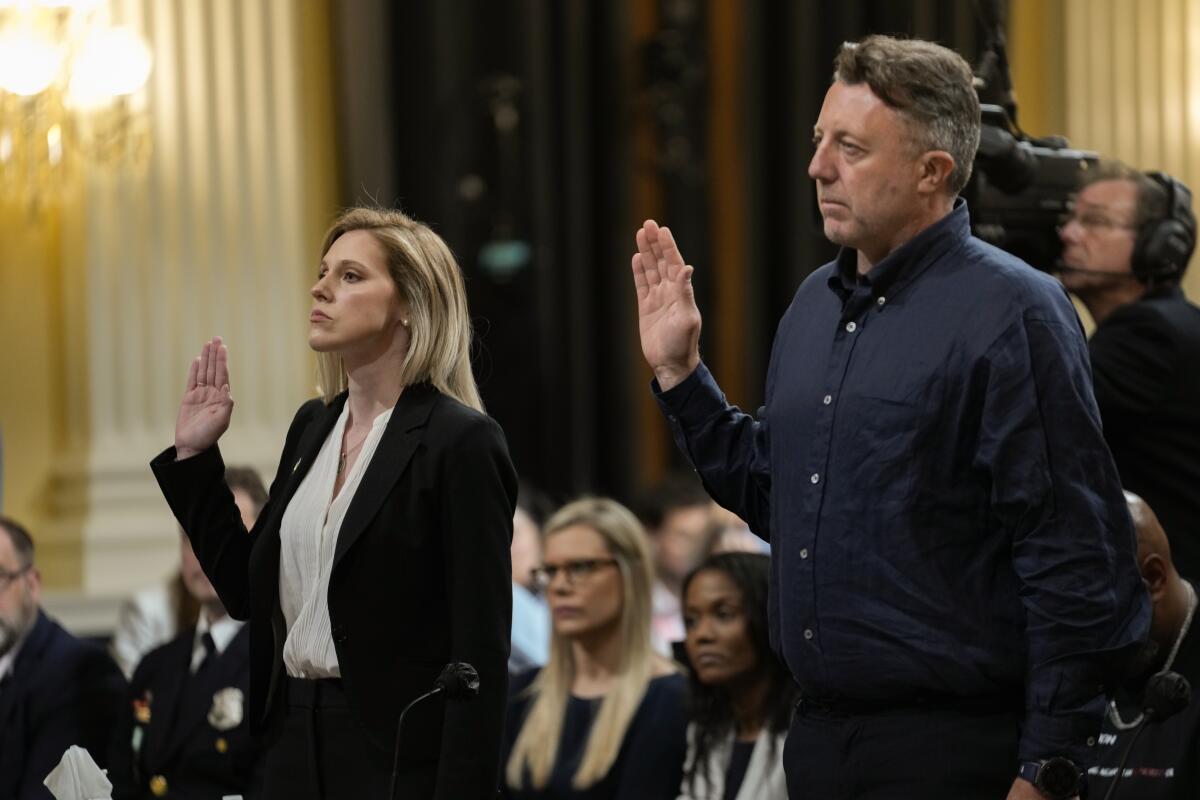
One of the most important tasks of the Jan. 6 committee members is changing the hearts of people who believe their effort is partisan.
Their most important witness in that regard Thursday may have been Caroline Edwards, a Capitol Police officer and the first member of law enforcement injured by the rioters.
Edwards appealed to the ideals of honor and duty often invoked by the most conservative Americans as she told her story.
She called herself “the proud granddaughter of a Marine” who fought in the Korean War. She spoke about the names she was called and the sense of duty she felt to protect the Capitol.
And she implicitly called out the hypocrisy of former President Trump’s most ardent supporters who rally to his calls for “law and order.”
“They dared to question my honor,” she said. “They dared to question my loyalties. And they dared to question my duty.”
“I’m a proud American, and I will gladly sacrifice everything to make sure that the America my grandfather defended is here for many years to come with you.”
Trump’s former chief of staff calls Capitol video ‘stunning’
For one Capitol officer, tears upon reliving Jan. 6
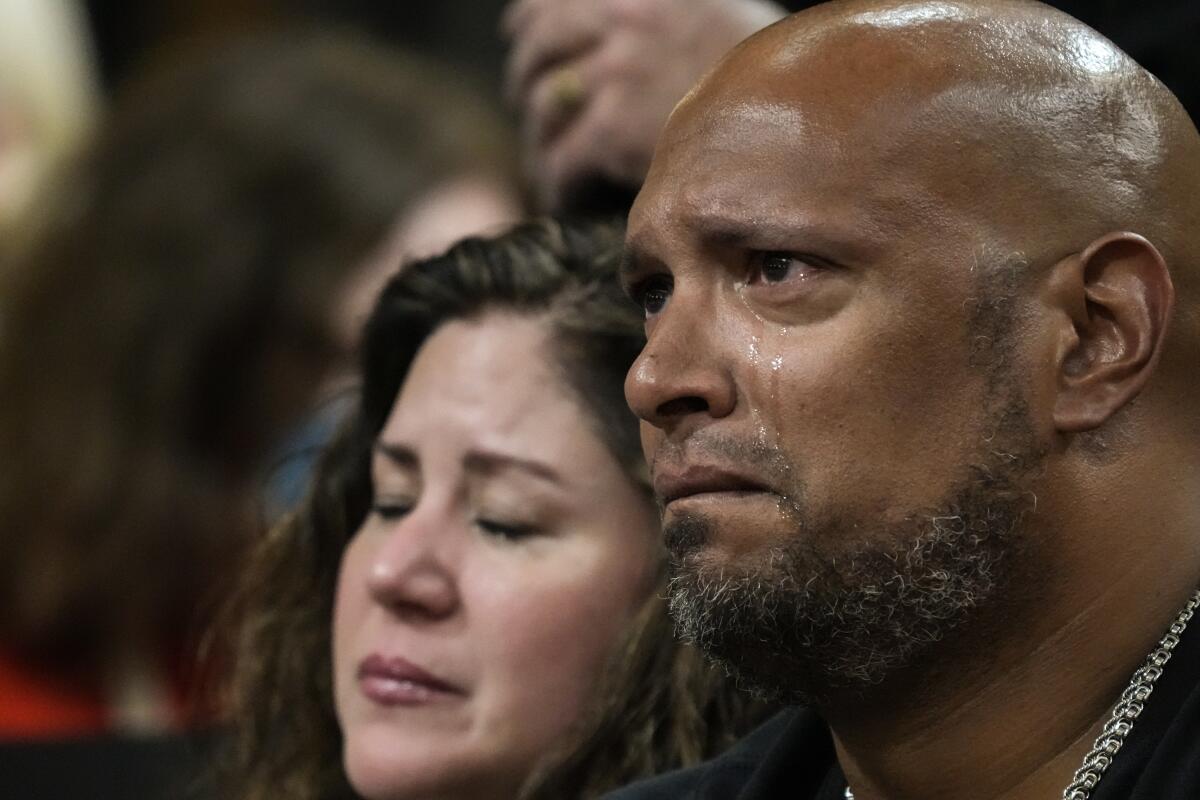
Milley: Pence was ‘explicit,’ ‘very direct’ in asking for backup from federal law enforcement

Chairman of the Joint Chiefs of Staff Gen. Mark Milley told the Jan. 6 House Select Committee that during the siege, Vice President Mike Pence was “very animated,” and used “explicit” and “very direct” language in demanding backup from federal law enforcement to counter insurrectionists.
According to Milley, Pence demanded that the general “get the military down here. Get the guard down here. Put down this situation.”
Then-White House Chief of Staff Mark Meadows’ comments struck a different tone, Milley said. According to Milley, Meadows said the administration needed to “kill the narrative that the vice president is making all the decisions.”
“We need to establish the narrative that the president is still in charge,” he said.
Milley said he interpreted Meadows’ comments as political and said it was “a red flag for me personally.”
Milley’s comments were made during a deposition, which the committee’s top Republican Rep. Liz Cheney (R-Wyo.) showed during her opening statement.
Scenes from the public seating area as dramatic Jan. 6 video plays
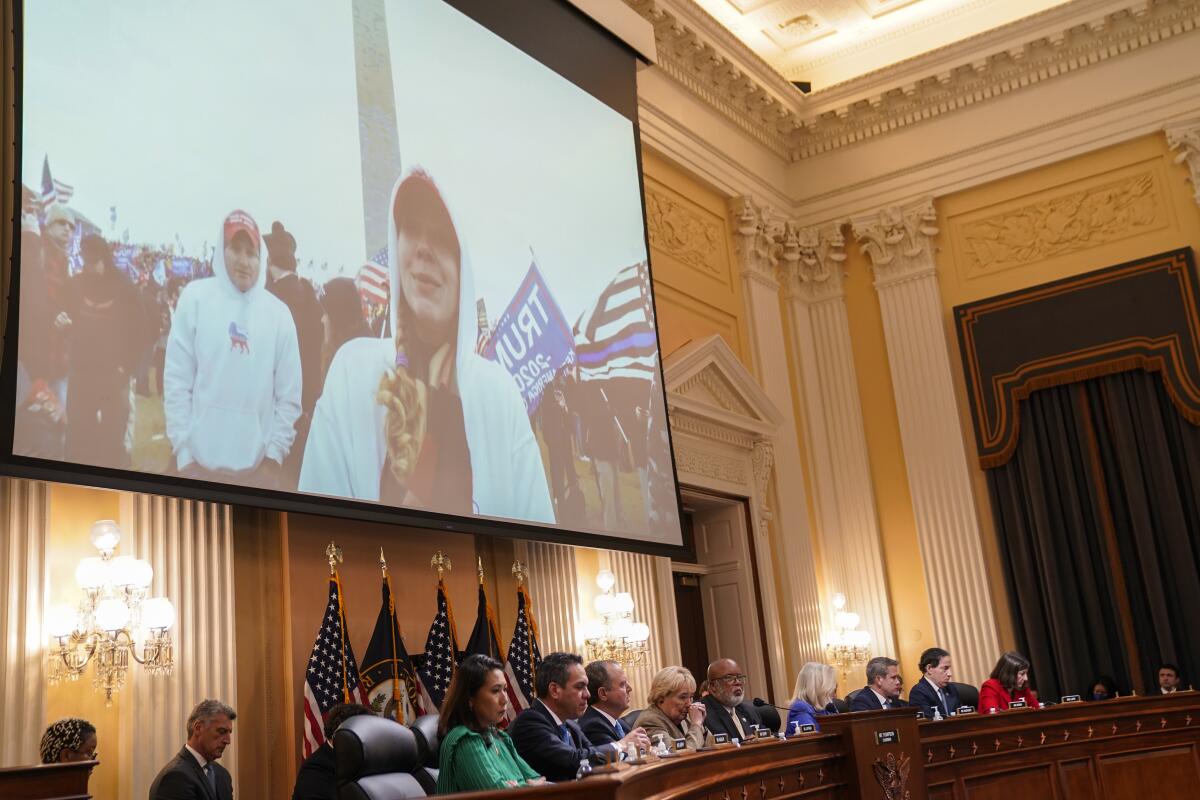
By about 8:50 p.m., the public seating area filled out, with just about a quarter of seats left empty. Audience members seemed glued to the screen, often nodding along to the committee members’ commentary.
As the panel began airing video of the Jan. 6 insurrection, depicting a violent crowd spilling into the Capitol, some audience members leaned forward. Others pulled out their phones to record the scenes. The video’s audio reverberates through the Cannon building, filling the space with the yells, chants and indistinguishable chaos from that day.
As reporters and the public stared at the screen, the nine-member select committee sat silently, solemnly looking below at the dais or toward the back of the room.
Cheney: Kevin McCarthy was scared during the insurrection
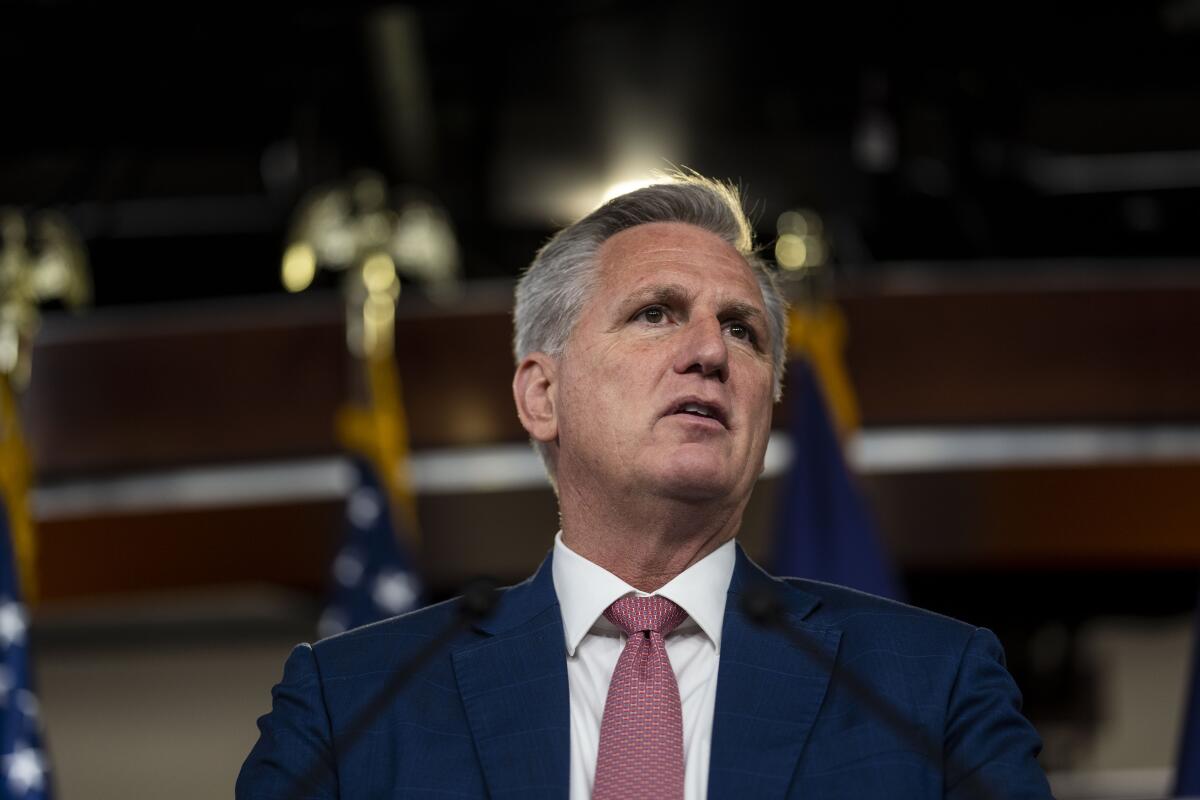
Rep. Liz Cheney, the top Republican on the committee, said there will be testimony that Minority Leader Kevin McCarthy (R-Bakersfield) was “quote scared and called multiple members of President Trump’s family after he could not persuade the president himself” to calm down the angry mob at the Capitol on Jan. 6.
The words carry special weight because McCarthy has tried to disavow his criticism of Trump and has joined the effort to downplay the events of Jan. 6, despite his early acknowledgments that the Capitol was in danger.
It will carry a second sting because Trump tends to ridicule people who aren’t “tough guys” in his view.
After Trump and other Republicans threatened McCarthy’s power, McCarthy led the effort to strip Cheney from her leadership post. Trump is now trying to get her defeated in a Republican primary in her home state of Wyoming.
Cheney has not relented and closed her opening statement with a rebuke of her fellow Republicans: “I say this to my Republican colleagues who are defending the indefensible: There will come a day when Donald Trump is gone. Your dishonor will remain.”
Top Republicans tell committee Trump was aware his election claims were false
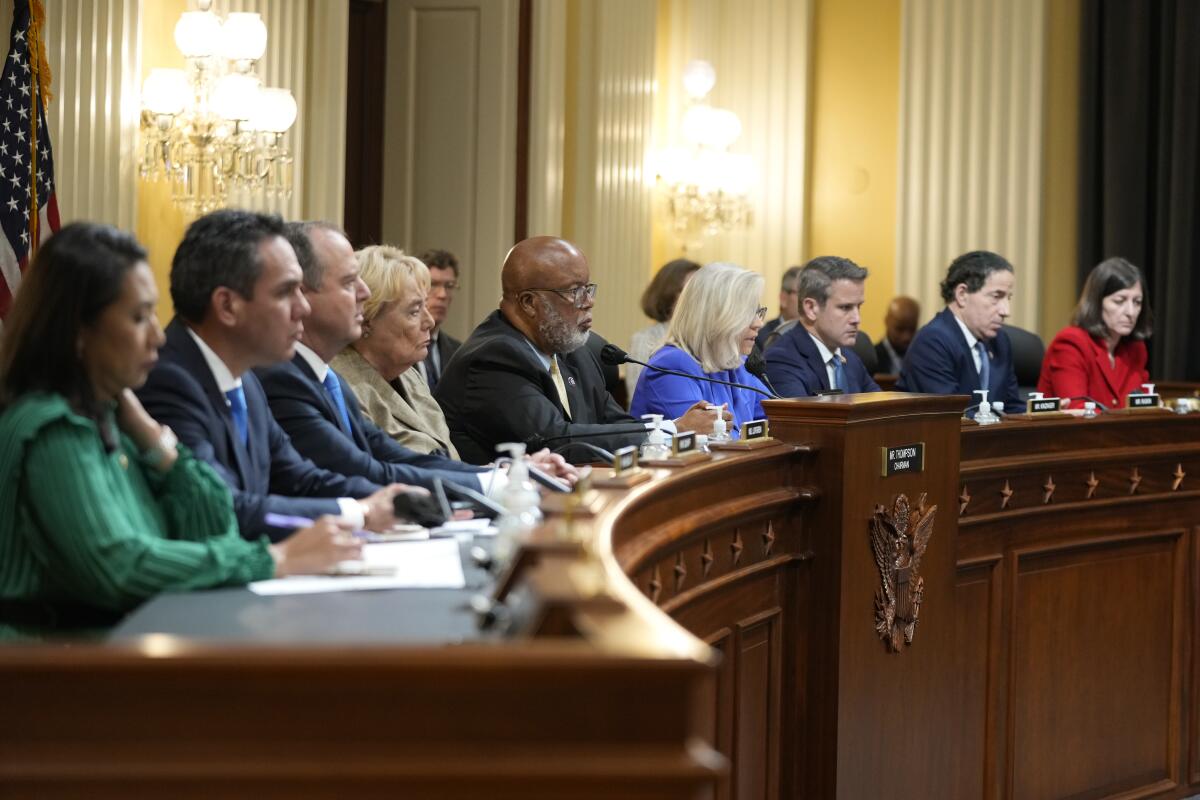
The hearing is getting started with a slew of Republicans and Trump supporters making the case that former President Trump knew that he was making false claims about a stolen election.
Former Atty. Gen. Bill Barr said he “repeatedly told the president in no uncertain terms, I did not see evidence of fraud that would have affected the outcome of the election.”
“And frankly a year and a half later I haven’t seen anything to change my mind on that,” Barr said in speaking with the Jan. 6 House committee.
Ivanka Trump, the president’s daughter and advisor, said: “I respect Atty. Gen. Barr. So I accepted what he said.”
And Jason Miller, Trump’s former communications advisor, said that he recalled “the lead data person was brought on and I remember he delivered to the president pretty blunt terms that he was going to lose.”
Rep. Liz Cheney, the Wyoming Republican and ranking member of the committee, introduced most of the videos featuring former staffers and promised more would come. This is an important part of Democrats’ case, and it was important that Cheney, a deeply conservative Republican, was the one to deliver it.
Cheney said that significant evidence would also come from the committee in the course of the hearings over the next three weeks showing Trump’s pressure campaign on Vice President Mike Pence. Cheney noted that Trump appeared to agree with calls from insurrectionists to hang Pence, alleging that evidence would show Trump said: “Maybe our supporters have the right idea. Mike Pence ... deserves it.”
Republicans have long known the hearing would be damaging, which is why they have worked so hard to discredit Cheney and remove her from her leadership role in the party. The core Republican strategy is to turn the hearings into a partisan exercise, rather than an examination of the role Trump played in trying to overturn the election.
Trump’s Atty. Gen. Barr, in deposition, discusses claim of election fraud, ‘which I told the president was bullshit’
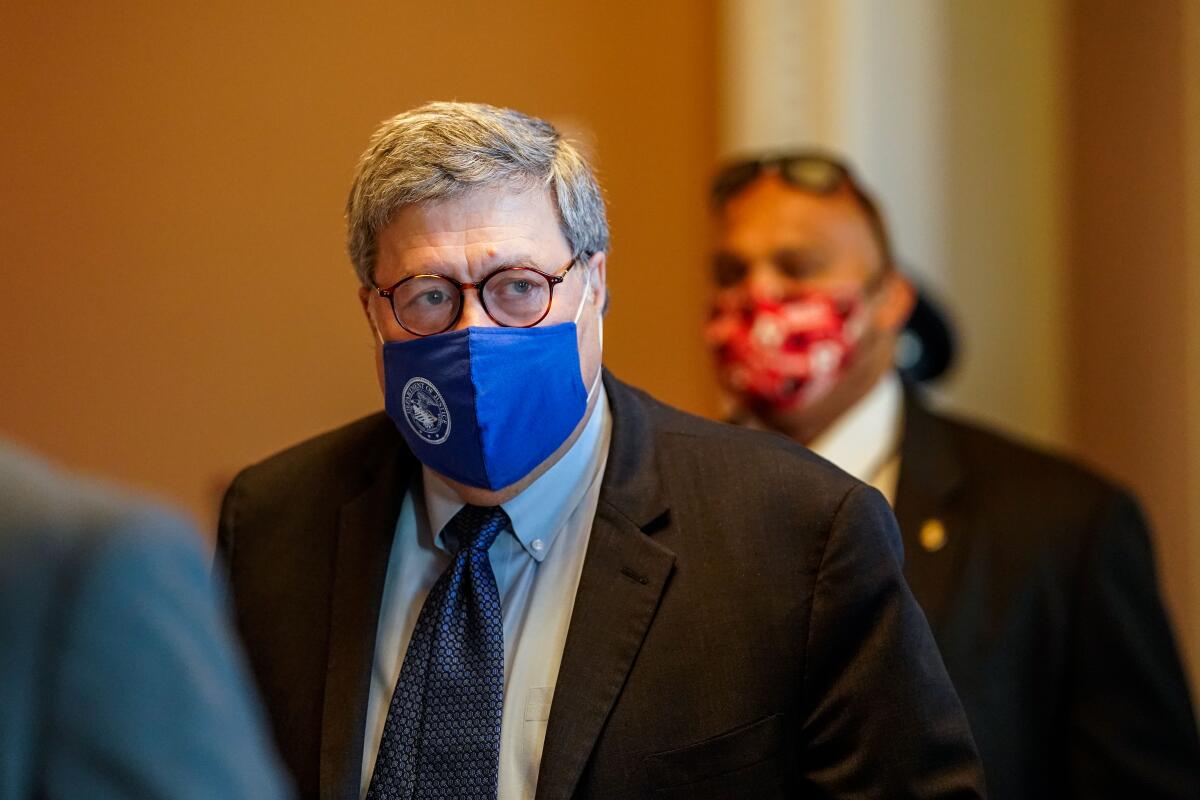
Former President Trump’s Atty. Gen. William Barr told the Jan. 6 House Select Committee said he thrice spoke with Trump and “made it clear I did not agree with the idea of saying the election was stolen.”
Barr said Trump’s assertions were partly why he parted ways with the administration .
“You can’t live in a world where the incumbent administration stays in power based on its view, unsupported by specific evidence … that there was fraud in the election.”
Barr’s video remarks were shown during the opening statement of U.S. Rep. Bennie Thompson (D-Miss.) in which he asserted that Trump’s own allies agreed that the 2020 election was not stolen from the former president.
Former President Trump’s Atty. Gen. William Barr told the Jan. 6 House Select Committee said he thrice spoke with Trump and “made it clear I did not agree with the idea of saying the election was stolen.”
D.C. officer who battled insurrectionists sits front and center
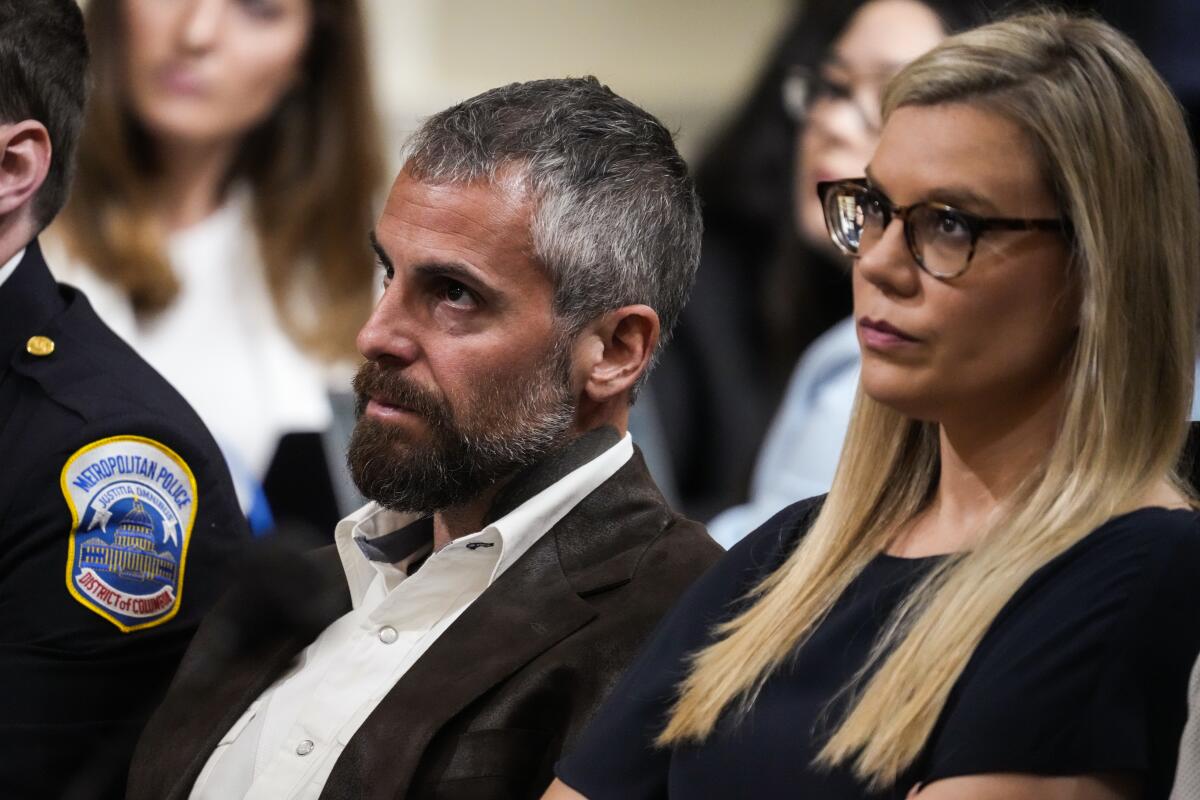
Former D.C. police Officer Michael Fanone, who suffered a heart attack after being beaten during the Jan. 6, 2021, insurrection, sits near the front of the room near the hearing’s witnesses.
Fanone was dragged into a mob and beaten during the violence at the U.S. Capitol. He later blasted lawmakers and others who downplayed the attack.
He resigned from the D.C. Metropolitan Police Department in December, and spoke to the L.A. Times in January, detailing the difficult emotional and physical recovery from the violence.
From inside the room: Reporters, phones and a modest section for the general public
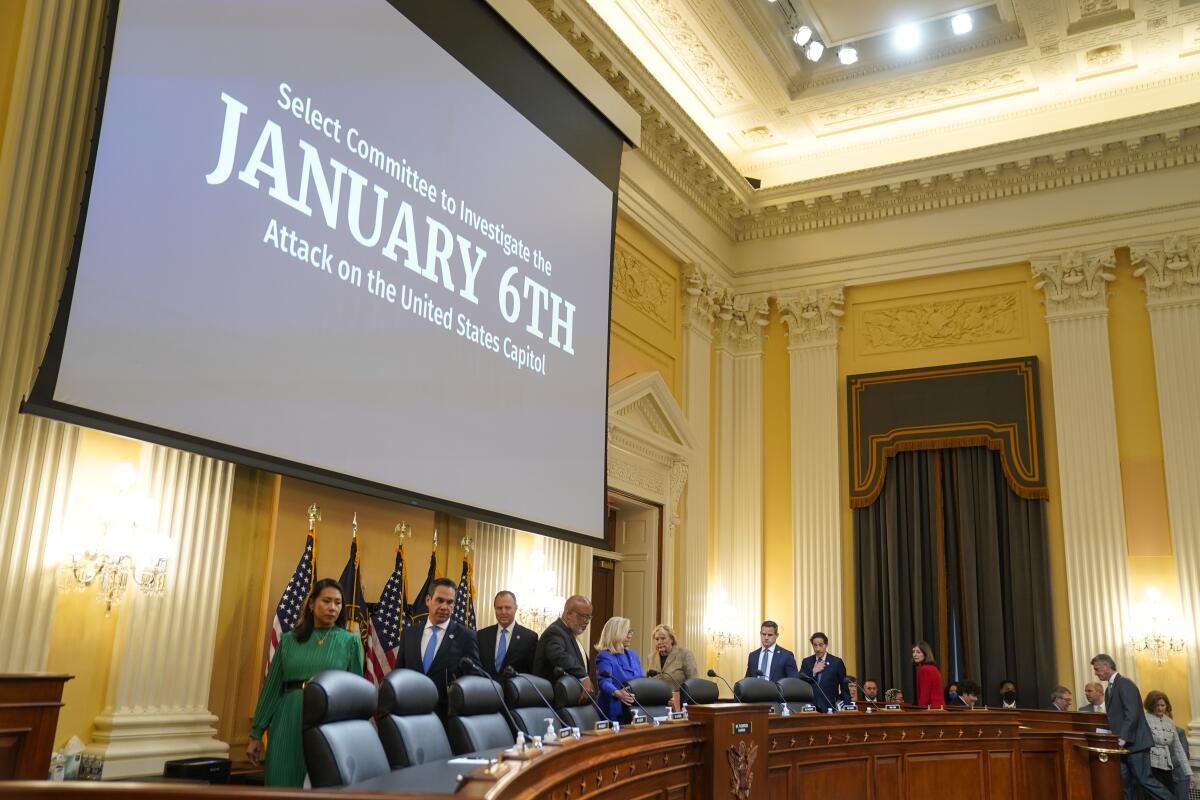
The Cannon Caucus Room is brightly lit, and voices echo through the room. The room is packed primarily with reporters. There’s a modest section for the general public, offering about 50 seats. About half remain empty.
Reps. Dean Phillips, Sara Jacobs, Pramila Jayapal and Tom Malinowski are among the crowd.
An enormous screen looms behind the nine-person select committee. As Chairman Rep. Bennie Thompson began speaking, the buzzing room fell silent. Many in the crowd pulled out their phones, and about 10 minutes into Thompson’s opening statement, many remain with their heads bowed over their phones.
Chairman announces deposition material will be released
Excerpt from Jan. 6 committee Chair Bennie Thompson’s opening statement
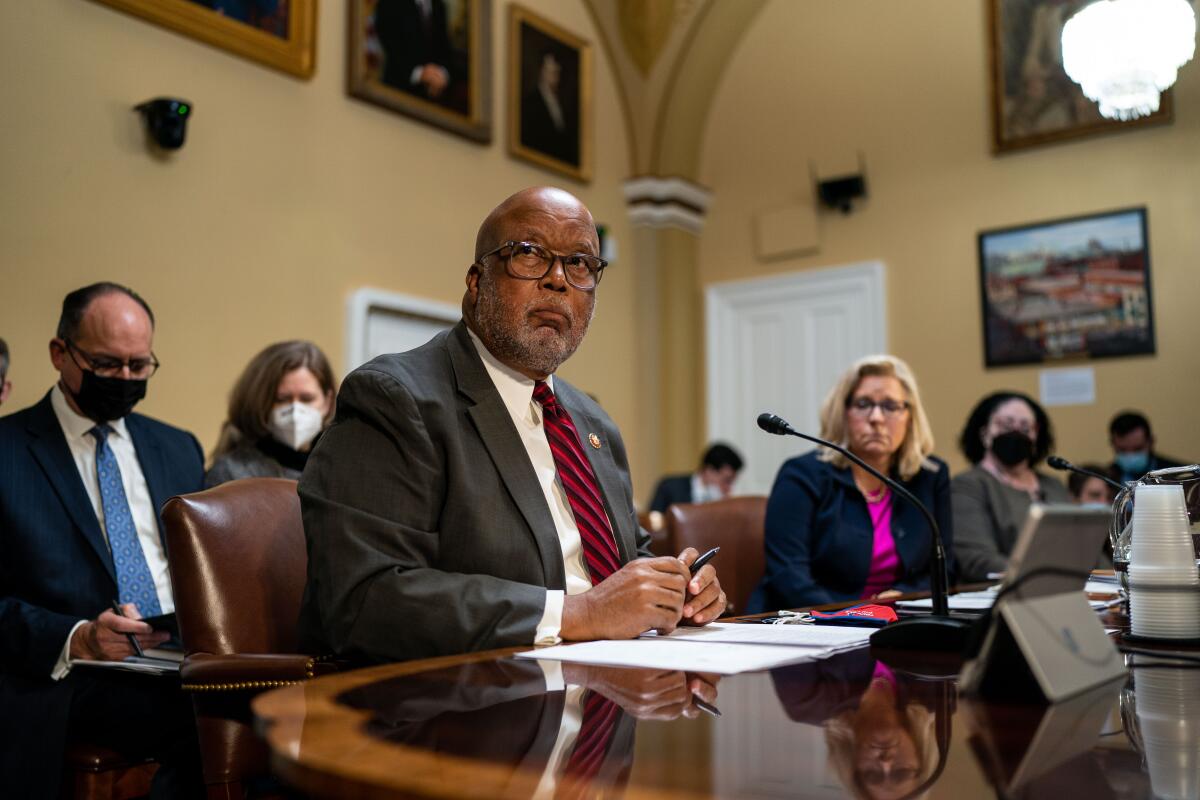
Rep. Bennie Thompson (D-Miss.), chairman of the House Select Committee to Investigate the Jan. 6 Attack on the U.S. Capitol, is expected to deliver these remarks in his opening statement during tonight’s hearing:
We can’t sweep what happened under the rug. The American people deserve answers. So I come before you this evening not as a Democrat, but as an American who swore an oath to defend the Constitution.
The Constitution doesn’t protect just Democrats or just Republicans. It protects all of us: “We the People.” And this scheme was an attempt to undermine the will of the people.
So tonight, and over the next few weeks, we’re going to remind you of the reality of what happened that day. But our work must do much more than just look backwards. Because our democracy remains in danger. The conspiracy to thwart the will of the people is not over.
There are those in this country who thirst for power but have no love or respect for what makes America great: devotion to the Constitution, allegiance to the rule of law, our shared journey to build a more perfect Union.
Jan. 6 and the lies that led to insurrection have put 2½ centuries of constitutional democracy at risk. The world is watching what we do here. America has long been expected to be a shining city on a hill. A beacon of hope and freedom.
A model for others — when we’re at our best. How can we play that role when our own house is in such disorder?
We must confront the truth with candor, resolve, and determination. We need to show that we are worthy of the gifts that are the birthright of every American.
Key dates to know for the Jan. 6 Capitol insurrection hearings
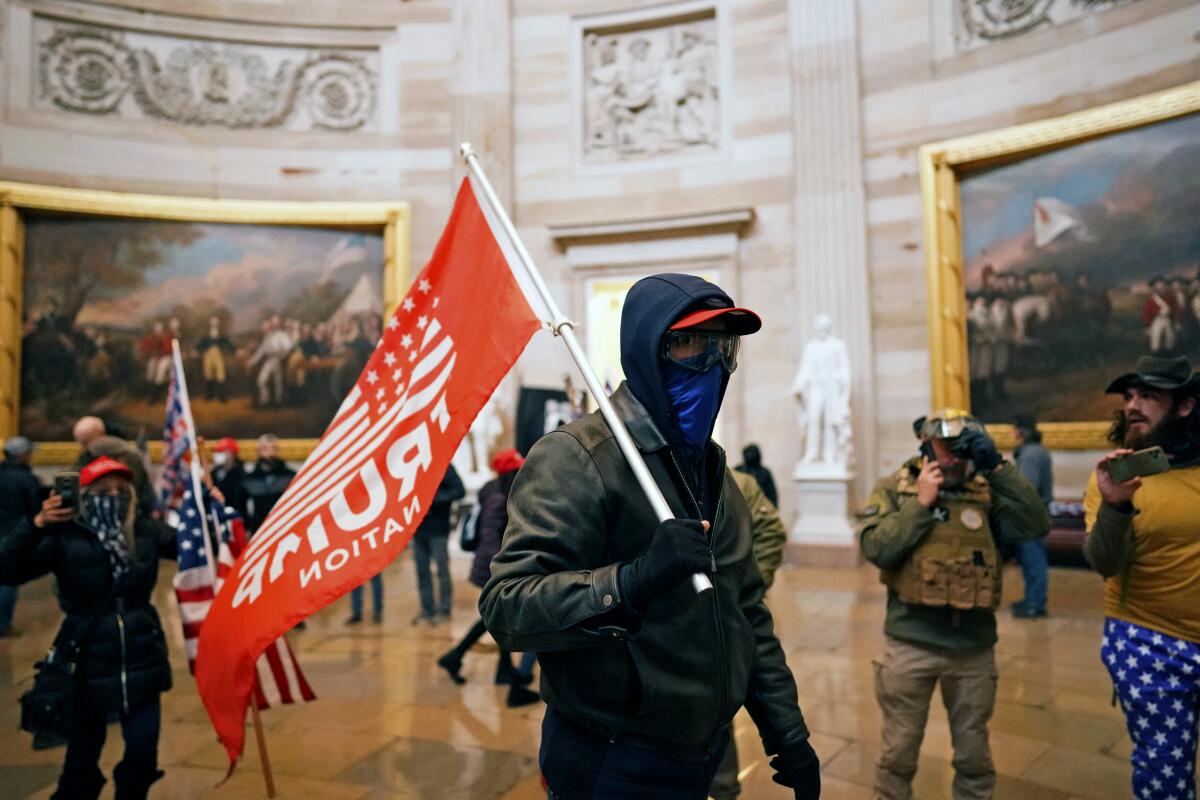
The House select committee investigating the Jan. 6, 2021, attack on the Capitol will try to lay out a narrative over the next few weeks of hearings that outlines what led to the insurrection and what role former President Trump and his allies played in the effort to keep him in office.
Though much of the committee’s investigation has occurred behind closed doors, some of the key dates have come out through news reporting and court documents.
Here are some of the key moments from the Nov. 3, 2020, election to the Jan. 6, 2021, attack on the Capitol as the hearings begin.
Who’s who on the House select committee to investigate the Jan. 6, 2021, Capitol insurrection
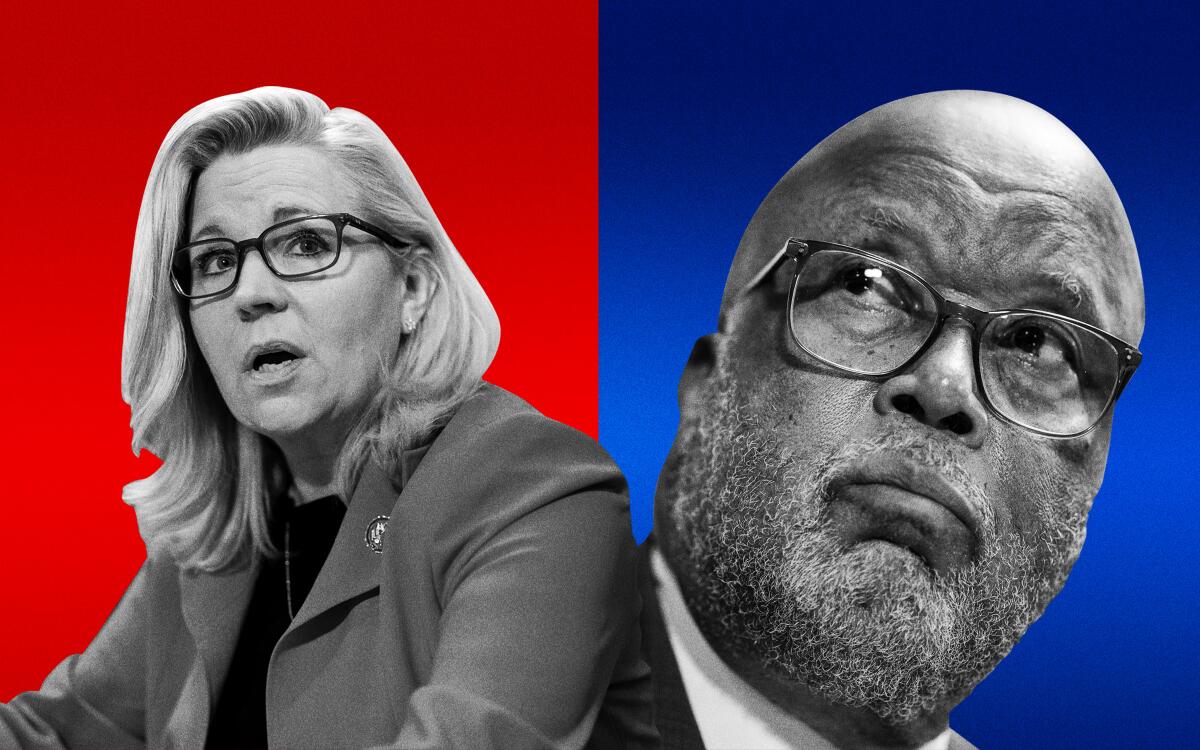
The House committee investigating the Jan. 6, 2021, insurrection at the nation’s Capitol will begin a series of six televised hearings on Thursday.
Much of the nine-member committee’s work has been conducted behind closed doors, with lawmakers participating in the more than 1,000 depositions collected by staff and poring through thousands of pages of documents as they try to reconstruct what contributed to the riot that temporarily delayed certification of the 2020 presidential election results.
Each member is expected to lead a portion of a hearing, some of which will be held in prime time. Here are the members you’ll see a lot of over the next three weeks.
This photo from Jan. 6 shows the calm courage of the chairman leading tonight’s hearing
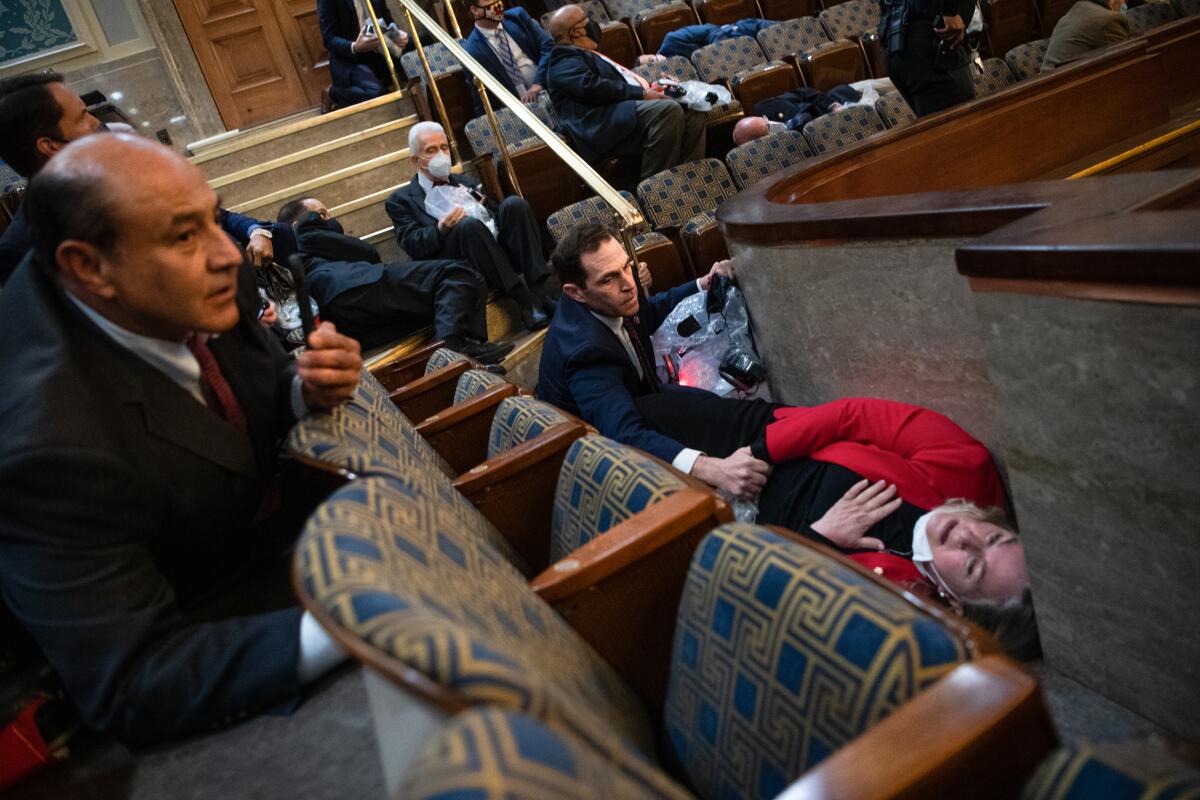
Leading tonight’s hearing will be the committee’s chairman, Rep. Bennie Thompson (D-Miss.), who has focused on domestic terrorism and cybersecurity — particularly election security — in his 17 years as the highest-ranking Democrat on the Homeland Security Committee.
Thompson is the only member of the committee who on Jan. 6 was in the House gallery, the area above the chamber’s floor that was evacuated last after rioters had broken the glass in the doors leading into the room and after one rioter was shot by Capitol Police trying to climb through a broken pane and into a hallway leading to the chamber.
Rep. Pete Aguilar (D-Redlands), who serves on the committee, said one image from that day has stuck with him as he has watched Thompson over nearly a year leading the committee. In the foreground, Rep. Jason Crow (D-Colo.) attempts to calm Rep. Susan Wild (D-Pa.), Rep. Lou Correa (D-Santa Ana) and several other members are taking cover, crouched between rows of seats. But Thompson sits in a chair in the background, seemingly calm in a moment of chaos.
“Bennie Thompson’s, like, sitting there. And I took that as he’s been through a lot — civil rights and he’s talked about his own personal history with the [Ku Klux Klan] and Mississippi. Him seated and not ducking under and diving under chairs — to me it was him saying, ‘I’ve been through a lot.’ And, like, ‘I’m good, I got this.’ And it’s that kind of quiet assurance and leadership that kind of carries with him. That has been helpful,” Aguilar said.
Thompson recalled the moment on CNN on June 3, saying that when Capitol Police ordered the members to get down and take off their lapel pins, he refused. Thompson is the only Black member of the four-person Mississippi congressional delegation.
“People I know fought and died in this country for me to have the right to represent them and for them to have the right to vote,” Thompson told CNN. “I’m not going to let any insurrectionist, rioter, crazy person come here and take this pin.”
Can the Jan. 6 committee prove Trump is a danger to the country? That’s what we’ll be watching
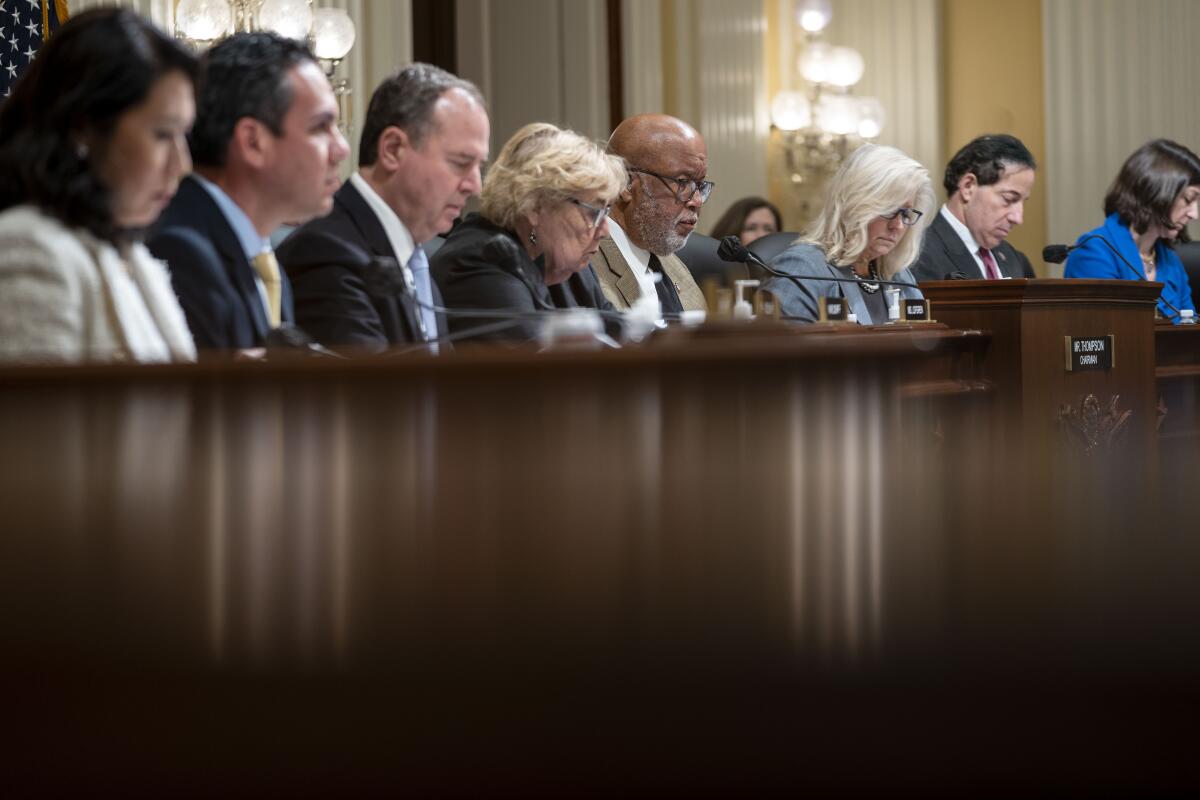
Members of the House Jan. 6 select committee have a hurdle even higher than the lawmakers who led two impeachment proceedings against former President Trump: He’s been out of office for 17 months.
Even some Americans who are appalled by Trump’s attempts to overturn the election and incite a violent mob may not feel the urgency of tonight’s hearings. The desire from some Americans, especially Republicans, to move on was felt during Trump’s second impeachment — which took place just after Jan. 6, 2021, as he was leaving office — and is even more pronounced now.
We’ve seen the effect over the last 15 months, as Congress has deadlocked along partisan lines over measures designed to protect ballot access, while Republican-led states have changed voting laws and elected officials supportive of Trump’s false claim that he won the election. Members of the Democratic Party have urged a passionate response but have not been able to galvanize bipartisan majorities.
The prime-time hearing will be aimed at convincing people that the danger is not in the past tense. Staff members on the committee have said they are making the case that the insurrection was not a solitary event or protest that got out of control, but the most dramatic and deadly event within a sustained and broad plot led by Trump to disrupt democracy.
The witnesses and evidence may tell that story. But presenting it as an ongoing threat to democracy is tough because many Americans, for better or worse, are not feeling the impact on their daily lives.
Polls show a country that is roughly evenly divided along partisan lines that vary only slightly, depending on which question is asked. An ABC News/Washington Post poll found, for example, that 88% of Democrats say Trump should be charged with a crime over the insurrection while 86% of Republicans say he should not be. The same poll found a similar partisan divide, though not as sharp, over whether the Jan. 6 committee is “fair and impartial.”
Large numbers of Americans in both parties feel more immediate anxiety over the economy. A recent FiveThirtyEight/Ipsos poll found 52% of Americans ranked inflation as their top concern, far and away the biggest issue. Republicans cited it more often but both parties ranked inflation at the top of their concerns, findings reflected in other polls and in both parties’ campaign strategies ahead of the midterm elections.
Staffers on the Jan. 6 committee say they aren’t there to indict Trump. The committee’s role is explaining how the insurrection happened and making recommendations to prevent it from happening again.
But their focus is Trump, who could well face legal trouble and is also likely to run again for president. And beyond that, he remains the leader of both the Republican Party and the broader movement to rally candidates around his false claim that the election was stolen.
But Trump has seen this playbook before, thanks to an unprecedented two impeachments. In both, he quickly grasped that it was a political proceeding, not a legal one, and proved adept at reframing the debate over his behavior as a partisan contest.
His efforts to rebrand Jan. 6 began as the plot was still unfolding and continued in its immediate aftermath, when he demanded that people including House Minority Leader Kevin McCarthy (R-Bakersfield) recant their criticism and reject a bipartisan process as a price for staying in power. That has cast the committee in a more partisan light, with the two Republicans who chose to serve on it — Reps. Liz Cheney (R-Wyo.) and Adam Kinzinger (R-Ill.) — branded pariahs and fake Republicans.
Can the Jan. 6 committee overcome these obstacles? Tonight is just the first chapter, but it’s notable that the hearing will not be carried on Fox News, which will instead be airing “Tucker Carlson Tonight.”
Here’s what to expect as the Jan. 6 committee hearings kick off tonight in Washington
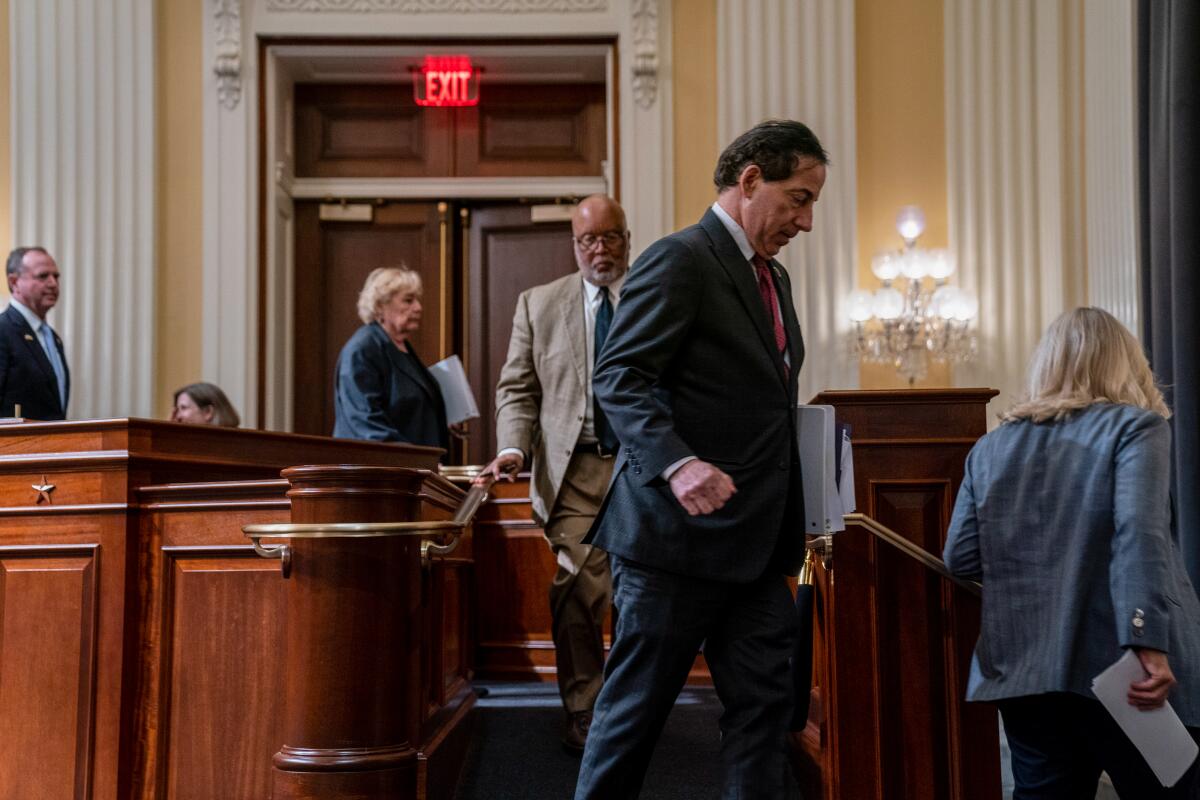
Hearings detailing the largest-scale investigation in congressional history begin Thursday, as the House Jan. 6 select committee works to explain how former President Trump’s false claims that the election was stolen boiled over to a riot in which more than a thousand Americans overwhelmed police and stormed the Capitol in an effort to stop the peaceful transition of power.
For just under a year, the committee has operated almost exclusively behind closed doors, hiring some of the nation’s top former prosecutors to conduct more than 1,000 depositions and collect more than 140,000 emails, phone records, internal memos and other documents, including presidential records from the National Archives.
Information gathering continues even as the three weeks of hearings are set to begin. The committee spoke with former Trump Atty. Gen. William Barr last week and is still fighting for access to records and testimony in at least two dozen court cases.
Though some information has leaked or been released as exhibits in the pending court cases, exactly who the committee has interviewed and what it learned has been tightly held under wraps. Only a tenth of the witnesses interviewed had to be compelled to speak with a subpoena, and committee aides said most of what will be shown Thursday will be never-before-revealed information.
Read more about tonight’s hearing from Sarah D. Wire.
Michigan GOP hopeful Ryan Kelley charged in Jan. 6 riot, roiling primary
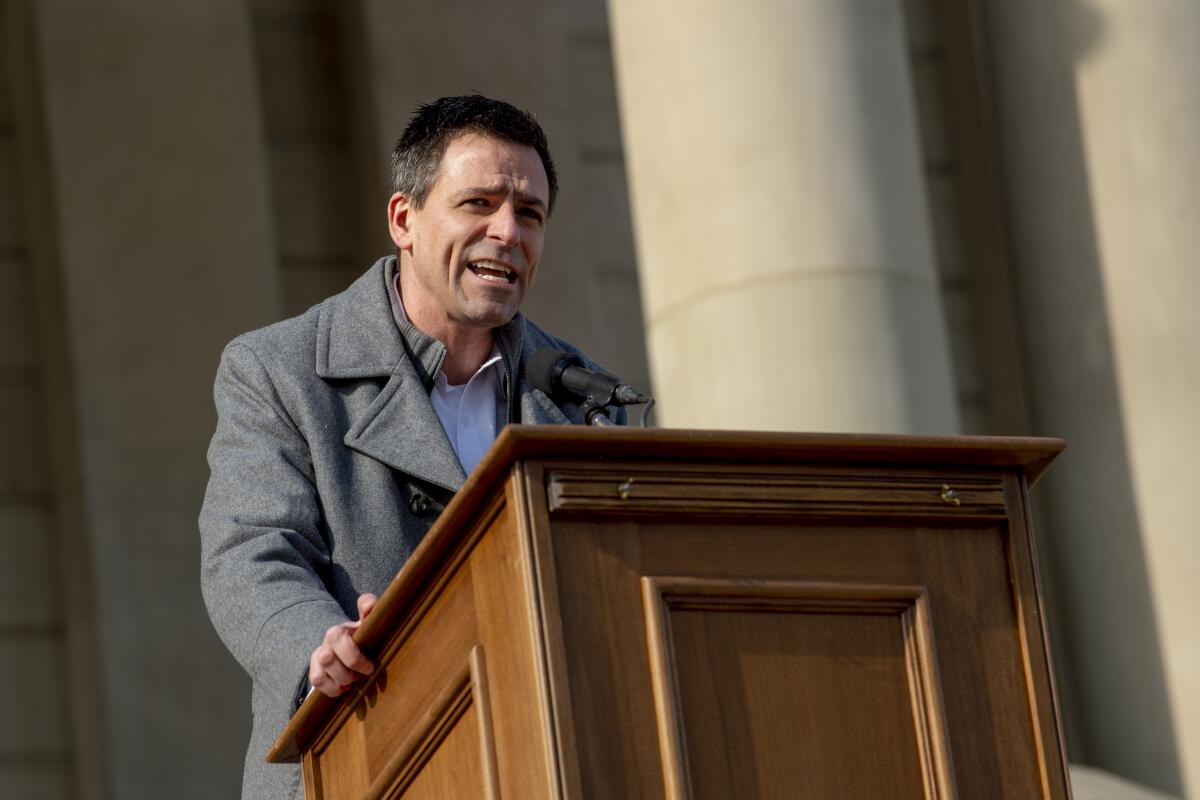
A Republican candidate for Michigan governor and ardent defender of former President Trump was charged with misdemeanors Thursday for his role in the 2021 postelection riot at the U.S. Capitol, further complicating an already messy GOP primary.
Ryan Kelley, 40, was arrested in western Michigan, FBI spokeswoman Mara Schneider said. He appeared at a brief hearing Thursday afternoon in federal court in Grand Rapids, where he was released from custody without posting bail. The government did not ask that Kelley be detained.
Kelley, a real estate broker who lives in Allendale Township, is accused of disruptive conduct, injuring public property and entering restricted space without permission, according to the criminal complaint.
In a court document made public Thursday, federal investigators said Kelley was recorded on video outside the U.S. Capitol on the day of the insurrection, repeatedly waving to the crowd and directing them toward stairs leading into the building. He used his phone to “film the crowd assaulting and pushing past U.S. Capitol police officers” and was in a crowd that climbed stairs to a Capitol entrance after causing police to retreat, the FBI said.
Key figures in the Jan. 6 Capitol insurrection hearings
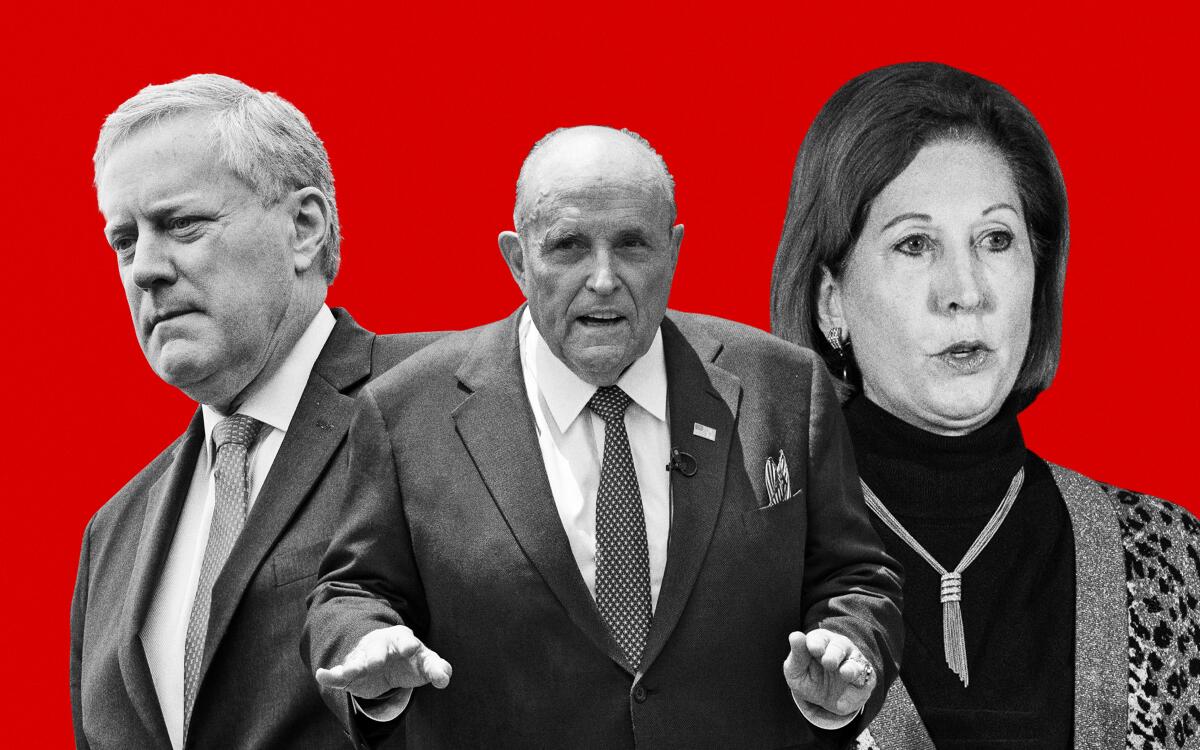
The House select committee will pull from more than 1,000 depositions and thousands of documents as it lays out the results of its investigation for the American people in at least six public hearings in the next few weeks. Hearings begin Thursday.
Nearly all of the committee’s work has happened behind closed doors, but enough information has emerged from court filings, public statements and leaks to media outlets to help piece together who the major players may be.
Here’s a breakdown of who’s who and how they figure into the hearings.
Watch live: Jan. 6 committee reveals its findings in prime time

